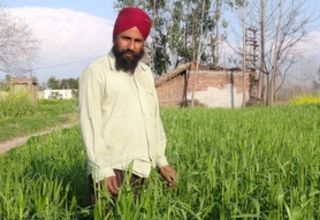Satinder Singh, Ghugh, Jalandhar - The flag bearer of nature

“Instead of paying interests to lenders, we should repay our debt to the mother earth, which has been showering us with such great natural wealth for ages.” These words don’t come from highly placed intellectuals or policy makers, but a humble farmer silently working closer to nature amidst all the challenges. Satinder Singh of Khug village near Jalandhar may own just over 3 acres of land but has a resolve which is greater than the biggest landlord.
A newspaper article on organic farming by Gurpreet Singh of Kheti Virasat Mission proved to be god sent for Satinder who was on the lookout for guidance in 2009. “While using chemicals I was always pained at how we were damaging the environment, especially the soil, which has given us so much. But I had several doubts stopping me from take the plunge. The team from KVM sorted out all of them to my satisfaction,” he says. The experiment started with fodder grass bersem. “I competed with my father who used chemicals to grow the same crop on equal piece of land. My crop reached the height of 7.5 feet which was a wonder but everybody called it a fluke. This shows that those doing chemical farming never give up easily even when facts are presented to them,” he informs.
Though going organic was an obvious choice for Satinder, it was not an easy one. Till four years back he was tilling the 24 acre family fields along with his two brothers and father. But his family members refused to put up with what they called ‘madness for organic’ and the family land was divided. But Satinder is not the one to give up easily. When the income from farming does not see him through, he works as a daily wager on the fields of neighbours. “Nowadays farmers have grown big egos and to satisfy them they claim to have got higher yields than others. But everybody knows the truth. The yields are dwindling as soil is getting infertile due to bad practices. I am satisfied with what I have chosen. My input cost is much less so I don’t need to take loans to buy fertilizers and seeds. In fact, in last four years, I have gone completely debt free,” Satinder says.
He has been using cow dung as a fertiliser to prepare the fields which sees him through for three years. The higher moisture content of the soil has also reduced the demand of water. “Even paddy requires just a week of flooding. What I am looking for now is the indigenous Sahewal cow which is supposed to be the best not only because of its nutritious milk but also the dung and urine,” he informs.
Though his resolve is strong, what hurts Satinder is when he sees the brand ‘organic’ being used wrongly. “There are many people who are certified organic farmers but use chemicals in their farms. Not only are they doing a great disservice to the society, these farmers don’t believe in the goodness of nature,” he laments.
However, that does not affect his work. In fact, Satinder feels when you start working with nature, the virtuousness seeps into your being. “It affects every aspect of your life. I stopped making false claims, have turned more grateful towards God and forgive easily. It’s more of a spiritual experience than just a shift in practice. Organic farming requires patience and belief in goodness of this world,” he shares his thoughts. This wisdom has been the obvious outcome of his faith in nothing but nature.
Contribution by Manu Moudgil